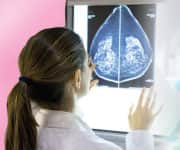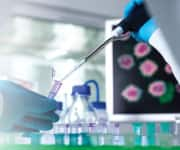Life Extension Magazine®
A meta-analysis published in 2021 found that low vitamin D levels are prevalent among newly diagnosed breast cancer patients.1

The authors noted that vitamin D insufficiency/deficiency may be linked with breast cancer initiation or progression.
One reason is that vitamin D regulates genes in cancer cells, inhibiting their growth and disabling their ability to survive. 1,2
For women already suffering from breast cancer, vitamin D may improve survival, reduce recurrence, and reduce all-cause mortality.3-5
An analysis published in the British Journal of Cancer found that the risk of death from breast cancer was 42% lower in women with high vitamin D levels, compared to those with low levels.6
The medical community is increasingly recognizing that vitamin D can help protect against breast and other cancers.
Risks of Low Vitamin D
Low levels of vitamin D are associated with many different problems, including brittle bones, increased cardiovascular disorders, and cognitive decline.7-10
Studies around the globe have associated a link between low vitamin D levels and increased risks of different types of cancer, including colon, ovarian, prostate, and breast cancers.
In Pakistan, for example, metastatic breast cancer was more prevalent in women with vitamin D deficiency than in those with slightly better vitamin D status.11
In a mainly Hispanic population, a high prevalence of vitamin D insufficiency (less than 30 ng/mL) and deficiency (less than 20 ng/mL) was found among breast cancer patients.12
Similar findings have been reported in women from other countries, including Brazil,13 Sudan,14 and China.15
How Vitamin D Protects Against Cancer

There is evidence that vitamin D helps protect against breast cancer in three different ways.
1. Vitamin D regulates genes in cancer cells.
The active form of vitamin D exerts its effects in the body by first binding to vitamin D receptors on the nucleus of cells. These receptors are also present in tumor cells.
Once it binds to these receptors, vitamin D regulates several dozen genes and pathways that inhibit the growth and lead to apoptosis (programmed death) of cancer cells.1,2
2. Vitamin D quenches inflammation by inhibiting the synthesis of inflammatory compounds.16
For example, vitamin D reduces the formation of pro-inflammatory prostaglandins that are associated with breast cancer development. It does this by decreasing their production and enhancing their degradation.5
Vitamin D also decreases levels of nuclear factor-kappa B (NF-kB) and tumor necrosis alpha (TNF), which have been linked to breast cancer formation and growth.17-20

3.Vitamin D supports immune function.
Vitamin D receptors are distributed throughout many tissues and organs, including the immune system (thymus, B and T lymphocytes, and bone marrow).21
The activity of various defense and immune cells, including antigen-presenting cells, macrophages, monocytes, and activated CD4 T cells is modulated by vitamin D.21
Experimental studies have demonstrated that the active forms of vitamin D (calcitriol) and its analogs can inhibit proliferation and induce apoptosis in various cancer cell types.22
Fighting Existing Breast Cancer

Vitamin D can also help patients who already have breast cancer.23-26
In a study that followed a group of women previously treated for breast cancer, those with the highest blood levels of vitamin D were 28% less likely to have died during the eight-year follow-up period than women with the lowest levels.26
A meta-analysis found that, in women whose 25-hydroxyvitamin D levels were 9.3 ng/mL or higher, every 4 ng/mL increase in vitamin D level decreased the risk of breast cancer death by 6%.25
Aromatase inhibitor drugs like letrozole or anastrozole are commonly used in breast cancer treatment. These medications may cause side effects in bones or muscles. These symptoms are worse for women with low vitamin D levels, and supplementation may help mitigate these.27-29
Summary

Low blood levels of vitamin D are associated with increased rates of breast cancer.
Vitamin D may exert its protective effects by regulating genes in cancer cells, quenching inflammation, and suppressing the levels and activity of estrogen.
In women who have already been diagnosed with this disease, vitamin D intake increases survival rates, and has been found to reduce pain associated with aromatase inhibitor treatment.
Life Extension® recommends that readers consider daily doses in the range of 3,000 IU to 8,000 IU for overall health.
Blood tests for 25-hydroxyvitamin D enable precise individual dosing of vitamin D supplements.
If you have any questions on the scientific content of this article, please call a Life Extension® Wellness Specialist at 1-866-864-3027.
References
- Voutsadakis IA. Vitamin D baseline levels at diagnosis of breast cancer: A systematic review and meta-analysis. Hematol Oncol Stem Cell Ther. 2021 Mar;14(1):16-26.
- Radom A, Wedrychowicz A, Pieczarkowski S, et al. Effect of Selected Factors on the Serum 25(OH)D Concentration in Women Treated for Breast Cancer. Nutrients. 2021 Feb 9;13(2):564.
- Madden JM, Leacy FP, Zgaga L, et al. Fitting Marginal Structural and G-Estimation Models Under Complex Treatment Patterns: Investigating the Association Between De Novo Vitamin D Supplement Use After Breast Cancer Diagnosis and All-Cause Mortality Using Linked Pharmacy Claim and Registry Data. Am J Epidemiol. 2020 Mar 2;189(3):224-34.
- Griffin N, Dowling M. Vitamin D supplementation and clinical outcomes in cancer survivorship. Br J Nurs. 2018 Oct 18;27(19):1121-8.
- Shao T, Klein P, Grossbard ML. Vitamin D and breast cancer. Oncologist. 2012;17(1):36-45.
- Kim Y, Je Y. Vitamin D intake, blood 25(OH)D levels, and breast cancer risk or mortality: a meta-analysis. Br J Cancer. 2014 May 27;110(11):2772-84.
- Garbossa SG, Folli F. Vitamin D, sub-inflammation and insulin resistance. A window on a potential role for the interaction between bone and glucose metabolism. Rev Endocr Metab Disord. 2017 Jun;18(2):243-58.
- Chen FH, Liu T, Xu L, et al. Association of Serum Vitamin D Level and Carotid Atherosclerosis: A Systematic Review and Meta-analysis. J Ultrasound Med. 2018 Jun;37(6):1293-303.
- Goodwill AM, Szoeke C. A Systematic Review and Meta-Analysis of The Effect of Low Vitamin D on Cognition. J Am Geriatr Soc. 2017 Oct;65(10):2161-8.
- van der Schaft J, Koek HL, Dijkstra E, et al. The association between vitamin D and cognition: a systematic review. Ageing Res Rev. 2013 Sep;12(4):1013-23.
- Udani SK, Qureshi SA, Lateef T, et al. Vitamin D and bone metabolism in breast cancer patients in Karachi, Pakistan. Pak J Pharm Sci. 2019 Mar;32(2 (Supplementary)):875-80.
- Farrag SE, Dwivedi AK, Otoukesh S, et al. Prevalence of Low Vitamin D in Patients with Breast Cancer in a Predominantly Hispanic Population at the American-Mexican Border. Nutr Cancer. 2017 Aug-Sep;69(6):819-24.
- Micheletti PL, de Borba Cecilio da Silva AP, Rech D, et al. Low Plasmatic 25-hydroxyvitamin D at Diagnosis is Associated with Axillary Invasion, Chemoresistance and Metastasis in Women with Breast Cancer. Arch Med Res. 2020 Aug;51(6):542-7.
- Husain NE, Suliman AA, Abdelrahman I, et al. Serum vitamin D level, sun-exposed area, dietary factors, and physical activity as predictors of invasive breast cancer risk among Sudanese women: A case-control study. J Family Med Prim Care. 2019 May;8(5):1706-14.
- Shi L, Nechuta S, Gao YT, et al. Correlates of 25-hydroxyvitamin D among Chinese breast cancer patients. PLoS One. 2014;9(1):e86467.
- El-Sharkawy A, Malki A. Vitamin D Signaling in Inflammation and Cancer: Molecular Mechanisms and Therapeutic Implications. Molecules. 2020 Jul 15;25(14):3219.
- Park YH. The nuclear factor-kappa B pathway and response to treatment in breast cancer. Pharmacogenomics. 2017 Dec;18(18):1697-709.
- Mercogliano MF, Bruni S, Elizalde PV, et al. Tumor Necrosis Factor alpha Blockade: An Opportunity to Tackle Breast Cancer. Front Oncol. 2020;10:584.
- Cohen-Lahav M, Shany S, Tobvin D, et al. Vitamin D decreases NFkappaB activity by increasing IkappaBalpha levels. Nephrol Dial Transplant. 2006 Apr;21(4):889-97.
- Haddad Kashani H, Seyed Hosseini E, Nikzad H, et al. The Effects of Vitamin D Supplementation on Signaling Pathway of Inflammation and Oxidative Stress in Diabetic Hemodialysis: A Randomized, Double-Blind, Placebo-Controlled Trial. Front Pharmacol. 2018;9:50.
- Vuolo L, Di Somma C, Faggiano A, et al. Vitamin D and cancer. Frontiers in endocrinology. 2012;3:58-.
- Thorne J, Campbell MJ. The vitamin D receptor in cancer. Proc Nutr Soc. 2008 May;67(2):115-27.
- Sofi NY, Jain M, Kapil U, et al. Reproductive factors, nutritional status and serum 25(OH)D levels in women with breast cancer: A case control study. J Steroid Biochem Mol Biol. 2018 Jan;175:200-4.
- Poole EM, Shu X, Caan BJ, et al. Postdiagnosis supplement use and breast cancer prognosis in the After Breast Cancer Pooling Project. Breast Cancer Res Treat. 2013 Jun;139(2):529-37.
- Hu K, Callen DF, Li J, et al. Circulating Vitamin D and Overall Survival in Breast Cancer Patients: A Dose-Response Meta-Analysis of Cohort Studies. Integr Cancer Ther. 2018 Jun;17(2):217-25.
- Yao S, Kwan ML, Ergas IJ, et al. Association of Serum Level of Vitamin D at Diagnosis With Breast Cancer Survival: A Case-Cohort Analysis in the Pathways Study. JAMA Oncol. 2017 Mar 1;3(3):351-7.
- Khan QJ, Reddy PS, Kimler BF, et al. Effect of vitamin D supplementation on serum 25-hydroxy vitamin D levels, joint pain, and fatigue in women starting adjuvant letrozole treatment for breast cancer. Breast Cancer Res Treat. 2010 Jan;119(1):111-8.
- Rastelli AL, Taylor ME, Gao F, et al. Vitamin D and aromatase inhibitor-induced musculoskeletal symptoms (AIMSS): a phase II, double-blind, placebo-controlled, randomized trial. Breast Cancer Res Treat. 2011 Aug;129(1):107-16.
- Arul Vijaya Vani S, Ananthanarayanan PH, Kadambari D, et al. Effects of vitamin D and calcium supplementation on side effects profile in patients of breast cancer treated with letrozole. Clin Chim Acta. 2016 Aug 1;459:53-6.
- Available at: https://www.breastcancer.org/symptoms/understand_bc/statistics. Accessed August 2, 2021.

